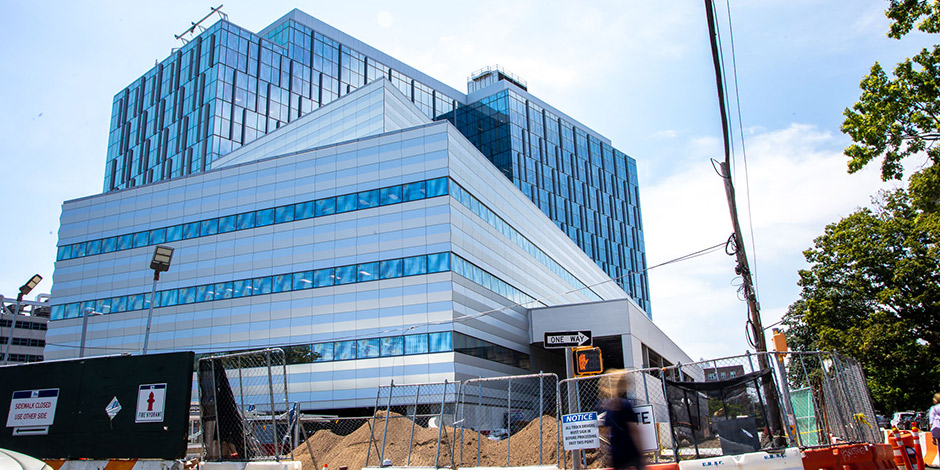Ten Years After Hurricane Sandy, NYC Health + Hospitals Makes Progress on Majority of Resiliency Projects
Oct 28, 2022

The new Ruth Bader Ginsburg hospital, built with funding from FEMA in response to Hurricane Sandy.
New York, NY
When Hurricane Sandy arrived on Sunday, October 29, 2012 nearly every large NYC Health + Hospitals’ facility sustained damage from rain, wind and flooding. The most significant physical damage and serious flooding happened at three of the system’s acute care hospitals – Bellevue, South Brooklyn Health, and Metropolitan – and one long term care facility and specialty hospital – Coler. Several other facilities experienced widespread power outages and wind damage. Over the past ten years, the health system has made significant strides to make its buildings and campuses more resilient – including building a brand-new hospital at the formerly named NYC Health + Hospitals/Coney Island, erecting flood walls, installing new boilers, and creating elevator flood protection. A total of 30 resiliency projects were initiated across the four primary affected facilities. The health system secured approximately $1.8 billion from the Federal Emergency Management Agency (FEMA) for these resiliency projects.
“Over the last ten years, our health system has planned, started, and completed many of the resiliency projects that will strengthen our hospitals and facilities in the event of another significant water and wind event like Hurricane Sandy,” said NYC Health + Hospitals President and CEO Mitchell Katz, MD. “We know how important our hospitals, clinics, and post-acute sites are to New Yorkers, and our facilities team has done an incredible job with these projects.”
“Our entire facilities team is dedicated to protecting our essential hospital system,” said Manuel Saez, Senior Assistant Vice President for the Office of Facilities Development at NYC Health + Hospitals. “When the work is complete, all of our facilities will be prepared to serve our patients in under even the worst of circumstances.”
Resiliency efforts include:
NYC Health + Hospitals/Bellevue
- Added flood barriers at elevators and mitigated the medical gas system to protect it.
- Add a new power source so that if the power grid goes down for an extended period of time and emergency generators fail, the hospitals critical functions will remain operating.
- Completing the design of the community floodwall with integrated flood gates that would form a protective boundary from 25th to 30th street in Manhattan.
NYC Health + Hospitals/Metropolitan
- Constructing a floodwall to protect the hospital over the500-year flood plain. The project is expected to be complete in 2024.
- Smaller mitigation projects such as ensuring that the medical gas system is protected are complete.
NYC Health + Hospitals/South Brooklyn Health
- Construction of the new Ruth Bader Ginsburg Hospital. The 11-story facility has an elevated emergency department, surgical suite with eight state of the art operating rooms, robotic surgery, an endoscopy suite, and inpatient dialysis.
- Added a new floodwall to protect the campus.
NYC Health + Hospitals/Coler
- In process to procure design services to create a campus flood protector.
- Boilers were replaced and raised over the 500-year flood plain.
- Most smaller mitigation projects are complete.
# # #
MEDIA CONTACT: pressoffice@nychhc.org, 212-788-3339
About NYC Health + Hospitals
NYC Health + Hospitals is the largest municipal health care system in the nation. We are a network of 11 hospitals, trauma centers, neighborhood health centers, nursing homes, and post-acute care centers. We are a home care agency and a health plan, MetroPlus. Our health system provides essential services to more than one million New Yorkers every year in more than 70 locations across the city’s five boroughs. Our diverse workforce of more than 43,000 employees is uniquely focused on empowering New Yorkers, without exception, to live the healthiest life possible. Visit us at www.nychealthandhospitals.org and stay connected on Facebook at https://www.facebook.com/NYCHealthSystem or Twitter at @NYCHealthSystem.